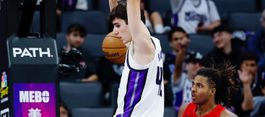Whether you’re new to daily fantasy football or a seasoned professional, be sure to check out our Daily Fantasy Football Glossary. You can get started with A Beginner’s Guide to Daily Fantasy Football or head to more advanced strategy — like Vegas Odds: Your Biggest Daily Fantasy Football Asset — to learn more.
So you’re new to daily fantasy sports contests and want the lowdown on some general strategy and terms? You’ve come to the right place, my friend. Below are some of the most common DFS terms with strategy tips for each.
View the top deposit bonuses and promo codes for each sportsbook ![]()
50/50 – A type of DFS contest that awards equal prizes to the top 50 percent of entrants, while the bottom 50 percent of entrants lose their money. These types of contests fall under the umbrella of Cash Games. Strategy: 50/50 contests don’t reward a better finish or more points, as all winning entrants are paid equally. It’s a better idea in these contests to go for safer plays with a reliable floor.
Bankroll – The amount of money a DFS player has pre-determined he will spend for a given time period.
Strategy: Playing DFS is a form of gambling, so be responsible. Determine how much money you want to spend for a month, for a sports season, etc and stick to it.
Budget (Salary Cap) – The amount of money you have to spend on players for your lineup. This varies from site-to-site and contest-to-contest. In each DFS contest, there is a Player Pool to choose from, and each player has a price assigned to him. You have to select your lineup within the constraints of the budget. This is commonly referred to as a Salary Cap.
Strategy: Use the budget to your advantage and look for players who may be overvalued or undervalued and figure out where to best spend your money.
Cash Game – A type of DFS Contest in which the top half (50 percent) of entrants are paid out equally. 50/50s and Head-to-Head contests are types of Cash Games.
Strategy: Cash Games don’t reward a better finish or more points, as all winning entrants are paid equally. It’s a better idea in these contests to go for safer plays with a reliable floor.
Ceiling – A player’s best potential finish. Ceiling is the opposite of floor.
Strategy: Players with a lower ceiling and higher floor are better for Cash Games because they are safer, while players with a lower floor and a higher ceiling are better for GPPs because of their high-risk/high-reward nature.
Expected Value (EV) – Expected value is the amount of money you can expect to win from one entry into a contest. For example, say you enter a contest with 100 entrants, your entry fee is $1 and the top-10 entrants are paid $5. Your EV can be calculated: 10 winning entries/100 total entrants = 10% (odds of winning) x $5 (prize to winners) = $0.50 EV.
Strategy: EV is typically higher in Cash Games because your chances of winning are automatically 50%. To increase your EV and gain an odds advantage, keep an eye out for Overlay.
Fantasy Points (FPTS) – Fantasy points are the points scored by the players in your lineup based on a site’s scoring system and rules.
Strategy: Scoring systems and rules vary from sport-to-sport, contest-to-contest, and site-to-site. Be sure you understand how players score points in any contest you enter.
Floor – A player’s worst potential finish. Floor is the opposite of ceiling.
Strategy: Cash Games don’t reward a better finish or more points, as all winning entrants are paid equally. It’s a better idea in these contests to go for safer plays with a reliable floor.
GPP (Guaranteed Prize Pool) – Also called Tournaments, GPP contests pay out a fixed amount of prize money to a smaller percentage of entrants than Cash Games, with winning entrants paid more for higher finishes. These contests offer a much higher reward than Cash Games, but the chances of winning are lower.
Strategy: GPPs pay out the same fixed amount of prize money no matter how many entries are received. That means that if the contest isn’t filled to capacity, the contest will pay out more money than it takes in. This is called Overlay, and it’s a great way to increase your odds of winning before any fantasy points are scored.
Head-to-Head (H2H) – A contest where you face just one opponent. One of you wins, one of you loses. This is a type of Cash Game identical to 50/50 contests, save the number of entrants.
Strategy: If you’re a beginner DFS player, target competitions that exclude Experienced Players. These are sometimes called Experienced Players Excluded (EPE). This ensures you don’t wind up head-to-head with an experienced professional.
Over/Under – The expected score of a real-life game. For example, the over/under of a matchup between the Chiefs and the Saints might be 45.5. Bettors then wager if the total combined score of both teams falls below or exceeds 45.5 points.
Strategy: It’s important to check the over/under of games when setting DFS lineups. A higher over/under indicates the score of a game should be higher, meaning players from teams in that matchup will likely see more opportunities. The opposite is true of games with lower over/unders.
Overlay – When a GPP contest does not fill to capacity, and the prizes paid exceed the entry fees taken in. For example, say you enter a $1 contest with a 5,000-entry capacity. The guaranteed payout of that contest is $9 to the top 500 entrants ($9 x 500 = $4,500), but only 4,000 entries are received. That means that the entry fees ($1 x 4,000 = $4,000) are now less than the total payout ($4,500). The difference ($500) is overlay.
Strategy: Overlay increases your odds of winning a DFS contest, because you face less competition for the same amount of guaranteed prize money.
Rake – The amount of money a fantasy site charges entrants per contest that ends up as profit for the site. A standard rake is 10% per contest, though this can vary.
Strategy: Keep rake in mind when playing 50/50 contests and H2H contests. These contests are not truly “double your money” payouts after rake is taken into account. For instance, a $5 entry into a 50/50 will commonly earn you a $9 prize if you finish in the top half of the contest. A $5 entry minus 10% = $4.50. Multiply that by 2 (double), and you get $9. Smaller rake means more money for the entrant and less money for the site, while larger rake is the opposite.
Slate – The games available to select players from for a given contest. Slates consist of multiple games, but there are single-game contests you can enter as well.
Strategy: Always keep slate size in mind when building DFS lineups, as this influences lineup variance, price point, and value of the available player pool.
Stack – A combination of more than one player from the same team in a single contest.
Strategy: Target stacks based on matchup and opportunity. For NFL contests, pass-catchers and quarterbacks make popular stacks, and in NBA contests, players in fast-paced games or facing weak defenses make popular stacks.
Stars & Scrubs – A common lineup construction strategy that involves mixing high-cost players with low-cost players. High-cost players are referred to as stars because they typically score a high amount of fantasy points. Low-cost players are referred to as scrubs because they typically score a low amount of fantasy points.
Strategy: Be on the lookout for cheap plays (scrubs) with an increase in opportunity or a hot streak that can exceed value comfortably and pair well with stars.
Value: Value is simply the number of fantasy points scored compared to the price paid for a player. The DFS community frequently brings up the value needed to win in contests as this type of representation: x5. This can be any number, but for reference, “x5” is common to NBA DFS contests, where it has become standard to target players whose value will multiply at least five times, and “x3” is more akin to NFL DFS contests. If a player costs $5,000 in an NBA contest, he would need to score 25.0 FPTS to hit value (to calculate, drop the zeros from a salary and multiply by 5, 5 x 5 = 25).
Strategy: The values listed above are simple examples, but understanding value will help guide your lineup-building efforts more effectively. For example, if you enter a GPP for NBA DFS and realize (through recent winning entries and plenty of practice) that you want to score at least 360 FPTS to cash and 400 to win big money, use your budget (50K on DraftKings, 60K on FanDuel, etc) to determine the type of value you’ll need from your players to achieve the desired point thresholds. In this case, if you played on FanDuel, your players would need to hit 6x value to score 360 points (360 / 6) and 7x value to hit 420 (420 / 6). You can then look at a player’s floor and ceiling, matchup, and Vegas Over/Under of his game to decide which players give you the best shot of hitting that value.
“Get the fundamentals down, and the level of everything you do will rise.” – Michael Jordan
As in real-life sports, you don’t need to get fancy in DFS contests to succeed. You just have to be really good at the basics. Thanks for reading, and best of luck in your DFS contests!
View the top deposit bonuses and promo codes for each sportsbook ![]()
Zachary Hanshew is a featured writer at FantasyPros. For more from Zachary, check out his archive and follow him @zakthemonster.







